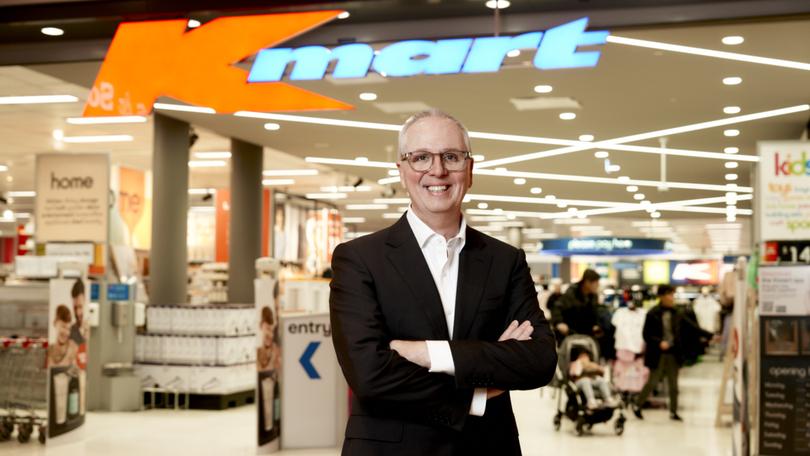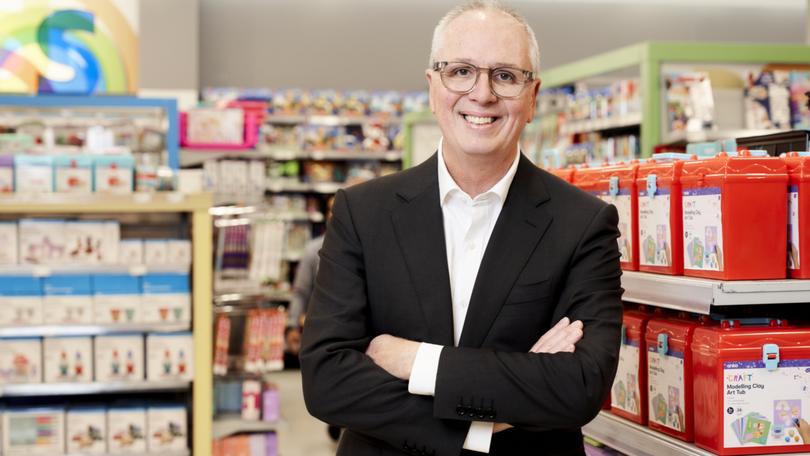The Nightly On Leadership: Kmart Group boss Ian Bailey on staying at number one and critical skills for retail
Staying at No.1 is a mix of sticking with what you're good at, while evolving for what’s ahead, says Kmart’s Ian Bailey

There is no way you could miss Kmart’s glow-up. Thanks to its hugely successful house brand Anko, with its low-priced versions of popular designer products, the company’s transformation from a laggard third-placed discount department store to leader of the pack has been one of Australia’s major retail success stories.
At the turn of the century Kmart was in dire straits, close to being closed with Target and Big W outperforming it. But in a spectacular turnaround, Target is now part of the Kmart Group and Big W is struggling to keep up.
With a workforce similar to that of a medium-sized regional city, being No.1 — and staying there — could be a major challenge. But Kmart Group managing director Ian Bailey says his 55,000-strong team is thriving on life at the top.
Sign up to The Nightly's newsletters.
Get the first look at the digital newspaper, curated daily stories and breaking headlines delivered to your inbox.
By continuing you agree to our Terms and Privacy Policy.“In many ways, the best place to be is in the middle,” Bailey says. “You’re not under threat and you’ve got so much obvious opportunity ahead of you.
“I think when you’re at the bottom ... you’re in survival mode. Now we’re at the top, and everybody in this market watches us, analyses us, inspects us for weakness, and tries to figure out how they take market share from us. The level of competition that you get when you’re No.1 is so different when you’re at the bottom of the pile, when people don’t really pay too much attention to you.”
Like many retail executives, Bailey came to the sector in a roundabout fashion. After some consulting work at PricewaterhouseCoopers, he became finance director at Officeworks, one of Kmart’s Wesfarmers stablemates.
Then came the opportunity to work alongside Guy Russo, to turn around Kmart. Russo — now a board director at Westfield owner Scentre Group and Mexican-themed eatery Guzman y Gomez — stepped down in 2016, leaving Bailey to take over.
Bailey recalls his period as Kmart’s chief operating officer in 2008 when the business was “really fighting for survival” and languishing behind its competition, as among the most challenging periods of his leadership tenure. He claims it even eclipsed the uncertainty of leading through the initial stages of the pandemic in 2020.

“The choices we made at that time would have been the difference between us surviving or not,” Bailey says.
“It was a question of ‘how do we navigate this uncertainty as well as we can?’ I never felt like our business was going to go broke during COVID. I didn’t feel our business wouldn’t be there when the COVID period came to an end, whereas in 2008 I didn’t know if there would be a 2009.”
By simplifying its business — famously by exiting several loss-leading categories — and putting its weight behind Anko, Kmart emerged stronger and more disciplined, and today sells its products into several overseas markets.
“We just want to offer the best products, at the lowest price that we can, every day. That’s pretty much what we’re trying to do,” Bailey says. “And I think if we start drifting away from that, that’s a problem.
“So on one end of the spectrum, we want to keep doing what’s made us really successful. Equally, if we just do that next year, we’ll go backwards. And the language we’ve used numerous times in our own organisation is, if we do nothing next year, we’ll be probably minus five per cent on sales. So if we want to be 10 per cent better, then of course, that means we’ve got to be 15 per cent better next year.
“So then we’ve got to very carefully select what we need to be better at next year that means our business is significantly improved.”
Bailey emphasises that this is where the corporate strategy kicks in, but the strategy itself is not about trying to be good at everything. Rather, it’s about trying to be really good at the things that matter to the business. For customers, that’s the lowest-price guarantee and protecting that from challengers.
“Our teams believe that we can be better again next year because we’ve got a track record of doing that,” he says. “The culture that you can create around success is really powerful. The thing we can’t do, though, is we can’t get overconfident; can’t think that we’ve got it all figured out. We can’t become arrogant that we’re in an unassailable position. Because that’s clearly not true.
“Everyone’s trying to eat a bit of our lunch. That’s the privilege of being the No.1, I guess.”
Keeping that position is also about finding improvements to just cement the ranking. Bailey points to home delivery as an example.
The level of competition that you get when you’re No.1 is so different when you’re at the bottom of the pile, when people don’t really pay too much attention to you.
A year or so ago, Kmart was averaging three to five days in metropolitan Sydney, Melbourne and Brisbane, compared to one to two days delivery time now, which he reckons has put Kmart “in the game” and away from an “unacceptable level”. But he doesn’t see rapid delivery, such as two hours as some rivals are pushing for, as the next step. He says that would add costs and mean higher prices.
Despite several years and counting — and hoping for more to come — at No.1, Bailey still believes there is more to do. He says the main thing is to not get ahead of yourself.
The need to evolve is the top priority and must in itself be a motivator, “constantly driving you to figure out” what’s next.
“I quite often think about ‘what does the organisation need me to be now?’ And as the world continues to evolve, and as our businesses have changed so much in the time I’ve been with it, the company has needed me to be slightly different at different times, depending upon the scenario.
“When we were in COVID and the world was just so complex, (with) so many unknowns, my job was to be calm. So my job was not to fill the business with lots of new ideas, it wasn’t to be innovative, frankly, and not necessarily to be inspirational. My job was to be calm and give people confidence.”
Bailey says, having spent time working to build high-performance teams, that a well-developed executive and other senior leaders provide “latent capacity” to not only execute well but to do new things.
“What we try and do is create the right environment with the right frameworks that allow leaders throughout the organisation to really know what it means to be a leader in Kmart Group, so that when we’ve got the 15-year-old who’s going for their first job, they hopefully have a great experience, because their manager in that store really takes pride in their role and pride in the team who’ve joined them,” he says.
Amid the positivity and confidence, Bailey maintains nothing is certain in retail. The use of artificial intelligence and improving productivity across the business are two of the top tasks on his to-do list. On AI, he says it’s crucial to work to understand what it can do for the business, how it’s relevant and what it can potentially achieve.
“Part of retail is you’ve got to constantly learn . . . I’m sure it’s not unique to retail, but I feel my learning curve today is just as steep as it was when I joined Officeworks in 2002 because there’s so many things that are changing all the time.”
But some things remain constant.
“Teamwork really matters. A genuine like of people is pretty helpful when you’re surrounded by people all day,” he says. “Being able to interact with people positively, I think those are evergreen skills — I don’t think they’re ever going to change.
“Anybody who’s in these roles has to have a love of learning new things and I think that’s probably the critical dynamic.”
